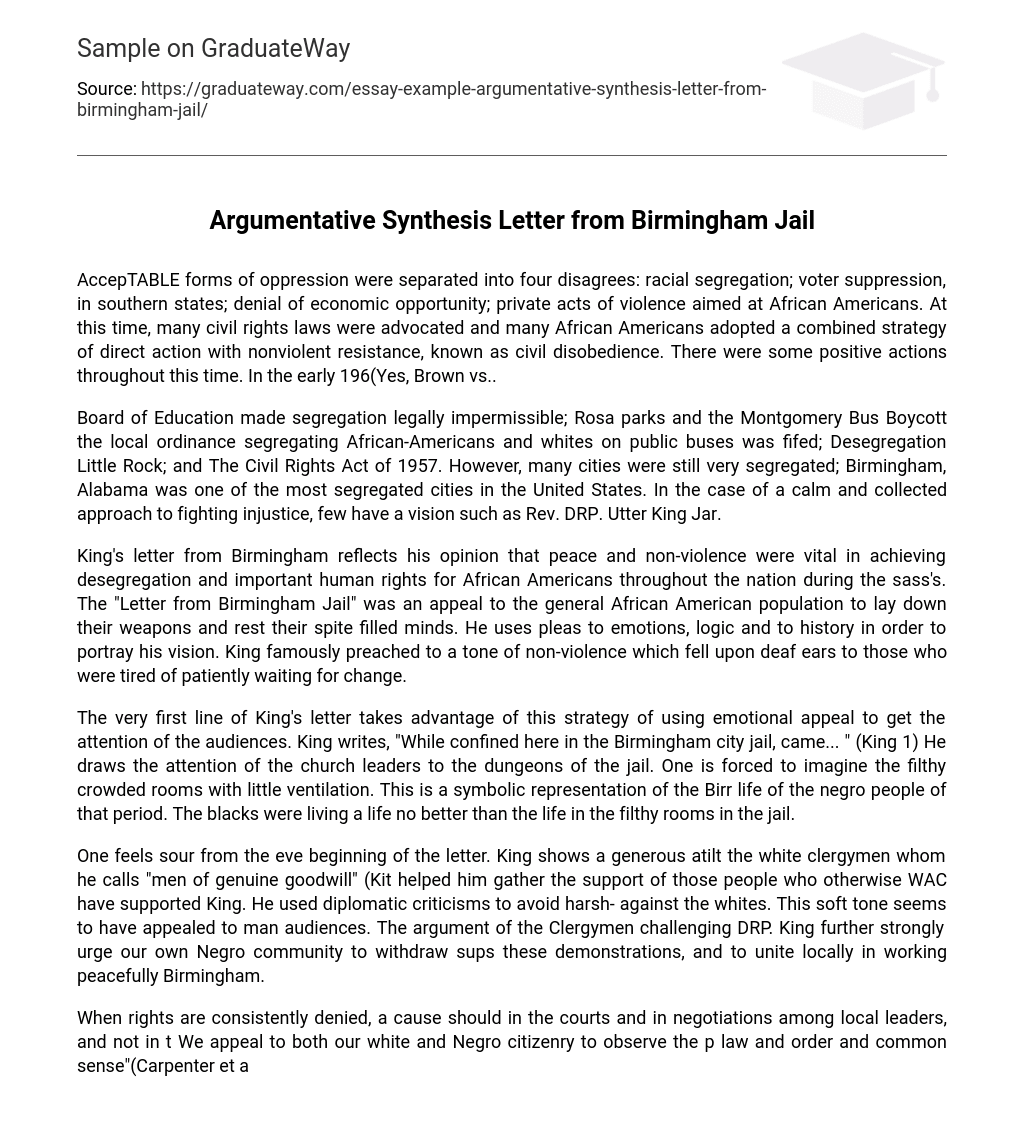AccepTABLE forms of oppression were separated into four disagrees: racial segregation; voter suppression, in southern states; denial of economic opportunity; private acts of violence aimed at African Americans. At this time, many civil rights laws were advocated and many African Americans adopted a combined strategy of direct action with nonviolent resistance, known as civil disobedience. There were some positive actions throughout this time. In the early 196(Yes, Brown vs..
Board of Education made segregation legally impermissible; Rosa parks and the Montgomery Bus Boycott the local ordinance segregating African-Americans and whites on public buses was fifed; Desegregation Little Rock; and The Civil Rights Act of 1957. However, many cities were still very segregated; Birmingham, Alabama was one of the most segregated cities in the United States. In the case of a calm and collected approach to fighting injustice, few have a vision such as Rev. DRP. Utter King Jar.
King’s letter from Birmingham reflects his opinion that peace and non-violence were vital in achieving desegregation and important human rights for African Americans throughout the nation during the sass’s. The “Letter from Birmingham Jail” was an appeal to the general African American population to lay down their weapons and rest their spite filled minds. He uses pleas to emotions, logic and to history in order to portray his vision. King famously preached to a tone of non-violence which fell upon deaf ears to those who were tired of patiently waiting for change.
The very first line of King’s letter takes advantage of this strategy of using emotional appeal to get the attention of the audiences. King writes, “While confined here in the Birmingham city jail, came… ” (King 1) He draws the attention of the church leaders to the dungeons of the jail. One is forced to imagine the filthy crowded rooms with little ventilation. This is a symbolic representation of the Birr life of the negro people of that period. The blacks were living a life no better than the life in the filthy rooms in the jail.
One feels sour from the eve beginning of the letter. King shows a generous atilt the white clergymen whom he calls “men of genuine goodwill” (Kit helped him gather the support of those people who otherwise WAC have supported King. He used diplomatic criticisms to avoid harsh- against the whites. This soft tone seems to have appealed to man audiences. The argument of the Clergymen challenging DRP. King further strongly urge our own Negro community to withdraw sups these demonstrations, and to unite locally in working peacefully Birmingham.
When rights are consistently denied, a cause should in the courts and in negotiations among local leaders, and not in t We appeal to both our white and Negro citizenry to observe the p law and order and common sense”(Carpenter et al). Utilizing a pathos approach in many segments of his letter, King years now I have heard the word “Wait! It rings in the ear of even piercing familiarity. This “await” has almost always meant “Never. ” come to see, with one of our distinguished jurists, that “justice TCO delayed is justice denied”(King 2).
Waiting after years of oppression harassment is easy to preach from the outside looking in, but Kink States that African Americans ” have waited for more than 340 ye constitutional and God-given rights”(King). The Clergy, who he IS to, pleads with DRP. King to continue “waiting” but 340 years is amp wait. King contain sues to say that some of the preachers of God have our he need for justice, but some have suppressed the blacks themes believes that the preachers have to break the traditional, unjustified the society to allow for the freedom of the children of God.
The trio of the Bible lies in justice and co-existence. He wants moral justice overcome the traditional norms which were unjust in nature. He c message well in his letter. He further writes: “One day the South M that when these disinherited children Of God sat down at lunch c were in reality standing up for what is best in the American dream most sacred values in our Judged-Christian heritage?’ (King 6). King also uses quotes from the Bible to further involve the emote attachment of the people with the Bible.
He compares himself wit Paul when he says that he is going to carry the gospel of freedom places beyond his native town. This served two purposes. On one could reach out to the illiterate people who knew of Paul through and on the other hand, he made it clear that he was undertaking , mission. So, the whites were expected to come to support him in god. Besides using the name of god to appeal to the people, King the real scenario of the life of the African American people to roar.





